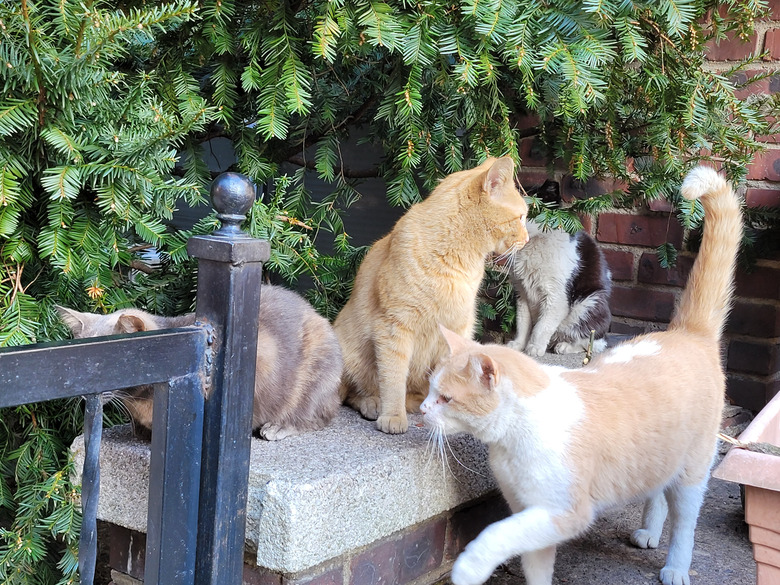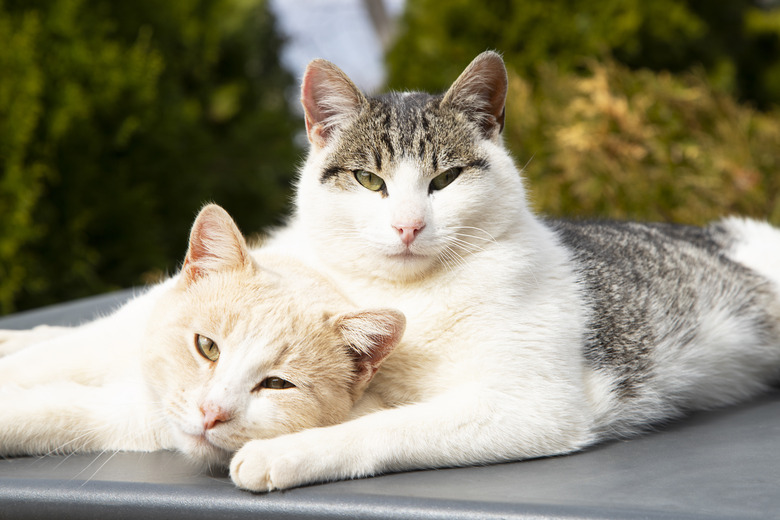Do Cats Learn Behaviors From Other Cats?
Ever wonder if your cat is a copycat? We know that cats are intelligent creatures and that they can communicate with one another but have you ever wondered if they can actually learn new behaviors from watching their feline friends? As anyone who's ever seen their kitty stare outside for hours will tell you, cats are curious creatures who love to carefully observe and learn from their environments. Well it turns out that they may well observe — and yes even mimic — other cats too.
Kittens learn cat behavior by copying mom
Kittens learn cat behavior by copying mom
A cat's capacity to copy starts very early, especially in wild cats. That's because being a good copycat is key to a young cat's ability to survive. A kitten will quickly learn to copy skills like hunting and grooming from its mom so that it can survive and thrive in the wild.
While it's true that some of a kitten's behaviors are based on instinct, like swatting and biting, they hone their hunting skills by watching mom catch and kill prey. They also learn how to do things like use the litter box and groom themselves thanks to their desire to mimic mom. The observational bond between mom and kitten is so close that it's believed that young cats learn better by watching their mom than when observing the behavior of a cat that they don't know.
Just how important is it for kittens to get a chance to copycat their moms? A study published on Nature showed that kittens who were weaned too early from their mother and siblings suffered impaired learning abilities and had a greater tendency to be anxious and exhibit aggressive behavior. It's believed that not having enough close contact with their mother and litter mates impeded social learning, which is clearly vital to a cat's behavioral development.
Cats are observational learners
Cats are observational learners
A cat's ability to learn from copying doesn't end when they exit kittenhood. One of the main ways cats learn to navigate the world is through observational learning. They spend much of their day staring at the world around them, including their owners and the other pet cats who share their home. Their amazing ability to monitor their surroundings is why cats get to know their owner's routines so well and even learn to recognize their owner's face and voice.
Because pet cats are such keen observational learners they can readily learn from other cats, especially if they get along well with one another. In a multi-cat household, cats can teach one another new behaviors, such as how to use a cat door. Cat behavior is centered in large part around non-verbal communication and felines teach one another appropriate cat behavior through actions rather than words.
Cats copy humans
Cats copy humans
Cats have iron-clad reputations as independent creatures who like to go their own way, so it might surprise you to learn that cats not only like to copy other felines, but they also like to copy some humans too.
In a study published on Science, animal behaviorist Claudia Fugazza and dog trainer Fumi Higaki showed that cats can learn new behaviors by imitating their owner's actions. In the experiment, Higaki's cat, Ebisu, touched a box with her paw and rubbed her face against it after first seeing her owner do so.
This ability to copy humans becomes more interesting when understood in light of evidence that cats appear to see their humans, not as a separate species, but rather as just bigger, stronger cats. Unlike dogs who show clear evidence of exhibiting different behavior patterns with humans than they do with other canines, cats use the same behaviors to communicate with us as they do with other cats.
Cats copy cat personalities too
Cats copy cat personalities too
It's interesting to note that felines are such good copy cats that they can even adapt their personalities to that of their owners. According to a study in the journal PLOS ONE, pet cats can start to mimic their owner's personality, especially when it comes to traits like extroversion, neuroticism and openness.
In summary
In summary
Cats are born copy cats who gain essential feline skills by mimicking the actions of their mom and litter mates. Cats are astute observational learners who acquire knowledge by watching and then mirroring what they see other cats do.
References
- Science: Kitty see, kitty do: cat imitates human, in first scientific demonstration of behavior
- Nature: Early Weaning Increases Aggression and Stereotypic Behaviour In Cats
- PLOS One: Owner Personality and the Wellbeing of Their Cats Share Parallels With the Parent-Child Relationship
- Your Cat: How Do Cats Learn?


